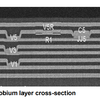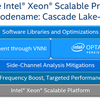Leveraging technology from Cycle Computing and NVIDIA, Microsoft is continuing to add Azure capabilities features that will draw in HPC and AI customers.
Episode 238: Addison Snell and Michael Feldman analyze China's latest announcement on the road to superconductor development, and TACC's new Fronterra system.
With a share price riding high and dominance in the datacentre market, it may seem perverse to state that Intel is a company facing a range of significant problems. So what caused the technology behemoth on the occasion of its 50th birthday to find itself so spectacularly on its back foot?
The Texas Advanced Computing Center (TACC) has announced Frontera, a Dell EMC cluster that will be the worlds most powerful academic supercomputer when it comes online in the summer of 2019.
Episode 237: Addison Snell and Michael Feldman analyze the HPC announcements from the Hot Chips conference.
China is investing $145 million to become a world leader in superconductor-based computing, a technology that could make semiconductor-powered supercomputers and datacenter servers obsolete.
In the second installment of our two-part report on the Student Cluster Competition (SCC), we trace the history of the top three teams at the recent ISC High Performance conference (ISC18) and look at the factors that drove their success.
At the Hot Chips conference this week, IBM outlined its plans to develop a new open standard memory interface that would be able to talk to different types of memory devices besides just DDR.
At the Hot Chips conference this week, Intel provided a few more details on Cascade Lake, the upcoming Xeon Scalable Processor that is scheduled to start shipping before the end of the year.
Fujitsu has announced the specifications for A64FX, an Arm CPU that will power Japans first exascale supercomputer. The system, known as Post-K, is scheduled to begin operation in 2021.








